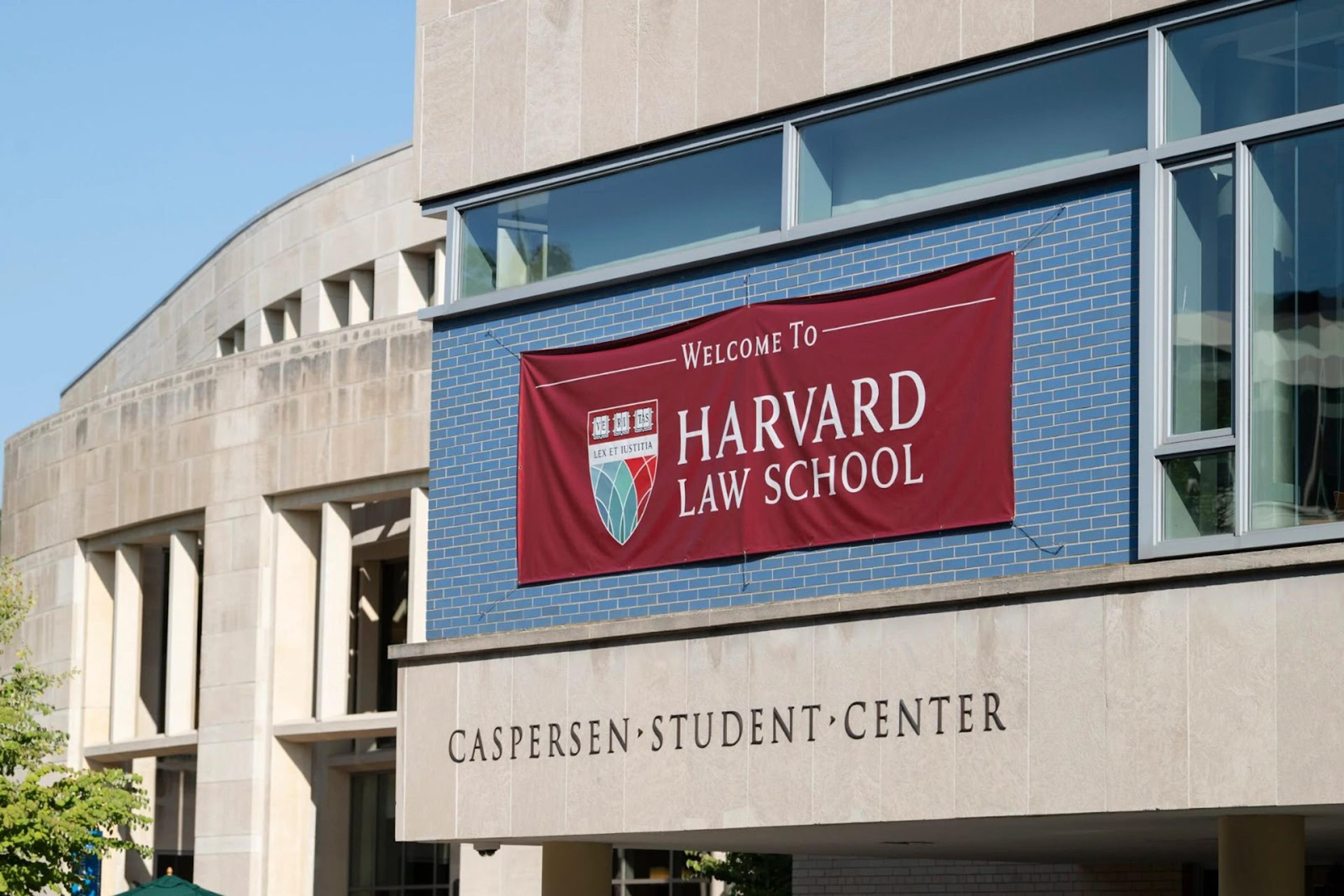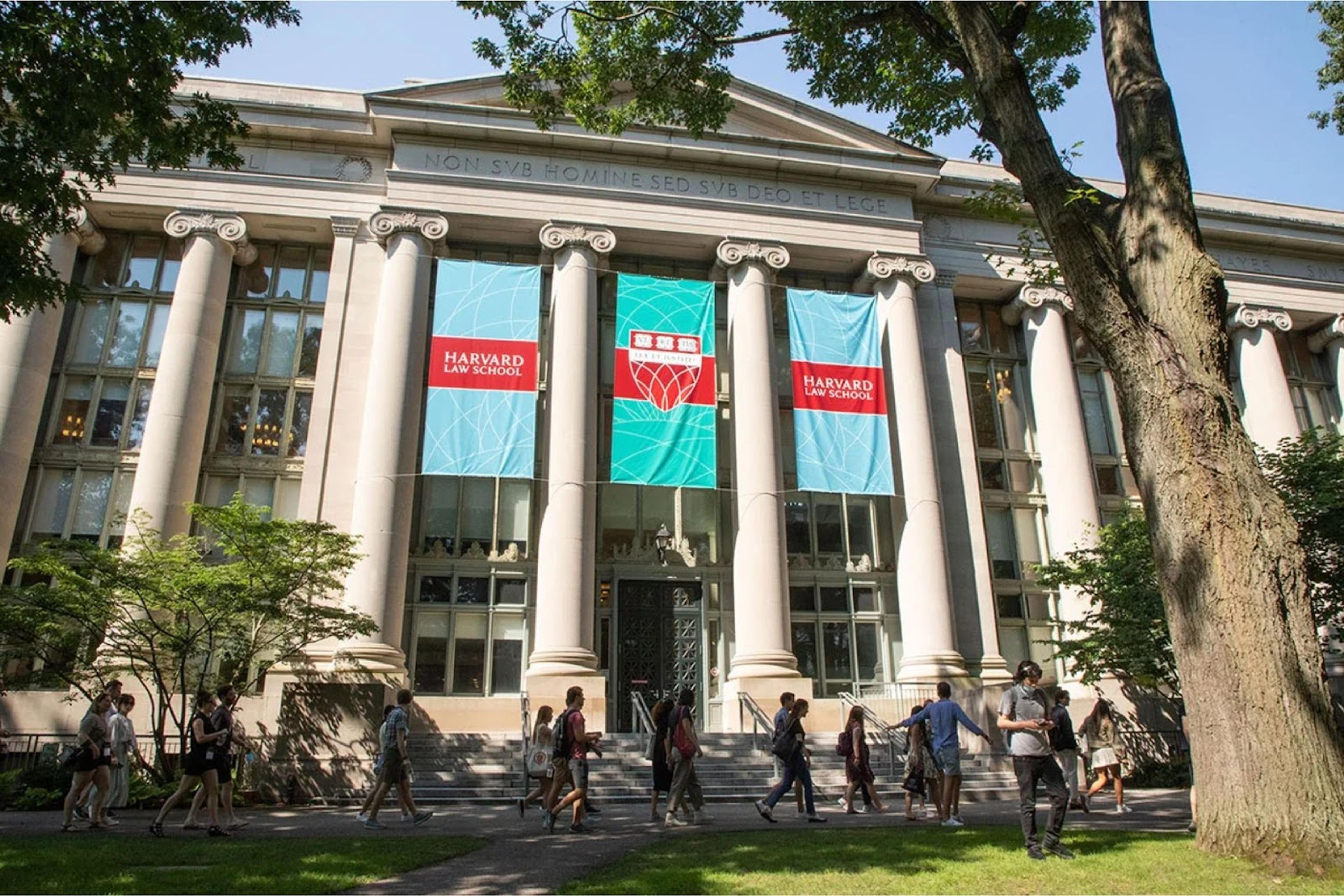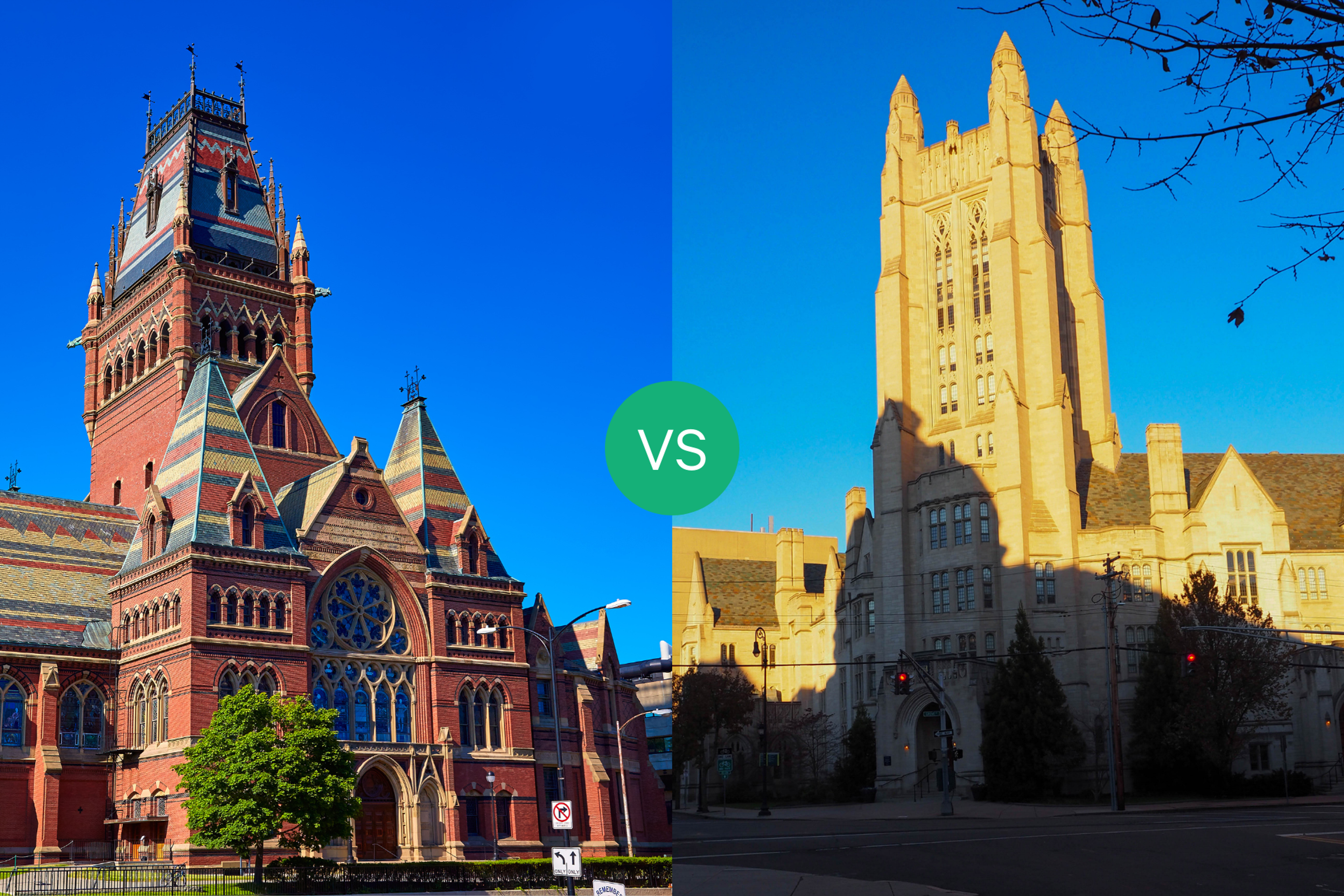How to Get Into Harvard Law School (2024-2025)
Learn how to get into the prestigious Harvard Law School
Posted March 6, 2025

Table of Contents
Free Event

Featuring Indrani S.
Law School App Office Hours with a Former Stanford AdCom Member
Starting Thursday, April 17
11:30 PM UTC · 45 minutes

Featuring Indrani S.
How Hard Is It to Get Into Harvard Law School?
Harvard Law School has an acceptance rate of 11%, making it one of the most selective top law schools in the world. For the JD Class of 2027, HLS received 7,235 applications. The school extended 793 offers of admission and 560 1Ls enrolled.
Harvard Law consistently ranks among the top three law schools in the U.S., often competing with Yale and Stanford for the number one spot. Its prestige attracts applicants with exceptional qualifications, but it also values diversity and looks for candidates from varied backgrounds and experiences, further narrowing the field for applicants with more traditional profiles.
Given these statistics, standing out in a competitive applicant pool requires not only academic excellence but also a compelling personal narrative and strategic application. If Harvard University is your goal, understanding these odds is the first step in crafting a successful strategy.
In this guide, we’ll walk you through each part of the application so you know exactly what you need to do to stand out and land a spot at this top-tier law school.
Harvard Law Acceptance Rate Over Time
| Class of 2027 | Class of 2026 | Class of 2025 | Class of 2024 | Class of 2024 | |
| Applications Received | 7,235 | 8,170 | 9,933 | 7,448 | 7,333 |
| Offers of Admission | 793 | 822 | 685 | 968 | 916 |
| Enrolled 1Ls | 560 | 460 | 370 | 445 | 494 |
| Acceptance Rate | 11% | 10.06% | 6.90% | 13.00% | 45.97% |
| Yield | 70.6% | 55.96% | 54.01% | 45.97% | 53.93% |
Programs Offered by Harvard Law School
Harvard Law School offers three different degree programs:
Juris Doctor (J.D.) Program
The J.D. is a three-year, full-time program that provides a comprehensive foundation in law. The first-year curriculum covers essential subjects such as civil procedure, constitutional law, contracts, criminal law, legislation and regulation, and property. In the subsequent years, students have the flexibility to tailor their studies through advanced courses, clinics, and research projects, allowing them to explore specific areas of interest and gain practical experience.
Doctor of Juridical Science (S.J.D.) Program
The S.J.D. is Harvard Law School's most advanced law degree, primarily aimed at those pursuing careers in legal academia. Candidates engage in extensive research and produce a dissertation that contributes to legal scholarship. The program offers a unique opportunity for deep academic inquiry under the guidance of HLS faculty, preparing graduates for scholarly and teaching roles worldwide.
Master of Laws (LL.M.) Program
The LL.M. is a one-year advanced degree program designed for individuals who have already earned a primary law degree. It attracts approximately 180 students from around 65 countries, fostering a diverse and international learning environment. The program offers a broad platform for students to design their own course of study, with opportunities to engage in U.S. law, legal theory, and specialized legal topics.
Admissions Requirements — Who Gets Into Harvard Law School?
Harvard Law Admissions Stats: LSAT, GPA, & Class Profile
One of the key benefits of attending Harvard Law School is that it attracts a diverse and accomplished group of students from all across the globe. The admissions office committee looks for candidates who will not only excel academically but also bring unique perspectives, leadership potential, and commitment to the class.
- Women: 53%
- Students of Color: 43%
- LGBTQ+: 22%
- STEM Majors: 13%
- First-Generation and/or Low-Income: 11%
- International: 9%
- Countries Represented: Armenia, Australia, Brazil, Canada, China, Finland, India, Japan, Kenya, Moldova, Nepal, Poland, South Africa, South Korea, Taiwan, Turkey, United Kingdom, Vietnam
- Undergraduate Institutions: 146
| 25th Percentile | 50th Percentile (Median) | 75th Percentile | |
| GPA | 3.89 | 3.95 | 4.00 |
| LSAT | 171 | 174 | 176 |
| GRE Quant | 164 | 165 | 169 |
| GRE Verbal | 165 | 167 | 169 |
| GRE Writing | 5 | 5.5 | 6 |
What LSAT Scores Do You Need for Harvard Law School?
- 25th Percentile: 171
- 50th Percentile: 174
- 75th Percentile: 176
To be competitive for admission to Harvard Law School, you'll generally need an LSAT score in the top 1-2% of all test-takers. Based on recent class data, the median LSAT score for admitted students is 174, with the middle 50% ranging from 171 (25th percentile) to 176 (75th percentile). While a score below 171 is possible with a standout application, aiming for 174 or higher maximizes your chances.
If you're submitting the GRE instead of the LSAT, strong scores in the verbal (165-169) and quantitative (164-169) sections are key, with a writing score of 5.5 or higher.
Expert Tip: The admissions process committee values strong test performance because it functions as a predictor of your ability to handle Harvard's rigorous curriculum.
What GPA Do You Need for Harvard Law School?
- 25th Percentile: 3.89
- 50th Percentile: 3.95
- 75th Percentile: 4.00
Harvard Law School sets a high bar for academic achievement. The median GPA for admitted students is 3.95, with the middle 50% falling between 3.89 (25th percentile) and 4.00 (75th percentile). If your GPA is below 3.89, you'll need to demonstrate extraordinary qualities in other areas of your application, such as work experience, recommendations, or a compelling personal statement.
While an exceptional GPA is critical, Harvard University also considers your course rigor and undergraduate institution. If your GPA isn’t perfect, aim for top-tier performance in other components of your application to remain competitive.
How to Get Into Harvard Law With a Low GPA/Test Score
- Write an amazing personal statement — Your personal statement and essays are your chance to show Harvard why you’re an exceptional candidate beyond your stats. Share a unique story, highlight meaningful experiences, and demonstrate how your background and goals align with Harvard Law’s mission.
- Secure great letters of recommendation — Strong letters from professors or employers who can speak to your intellectual ability, work ethic, and character can make a significant impact. Harvard University values endorsements that provide specific, persuasive examples of your potential. If your numbers don’t accurately demonstrate your qualities, then find people who can vouch for them.
- Retake the LSAT, or take the GRE — If your initial test score is below Harvard’s median, consider retaking the LSAT to improve your score. Many applicants see significant improvements with additional preparation. Alternatively, if the LSAT isn’t your strong suit, taking the GRE can be a smart strategy, as it provides another opportunity to showcase your academic potential. Be sure to focus on scoring competitively in both the verbal and quantitative sections.
- Write an addendum — If there’s a valid reason for your lower GPA or test score—such as illness, personal hardship, or other extenuating circumstances—write an addendum to explain the situation. Be concise, factual, and professional, focusing on how you’ve grown from the experience and proven your capabilities since.
- Apply as early in the cycle as possible — Applying early in the admissions cycle can give you an edge, as spots are more plentiful and admissions committees have more time to review holistic applications.
- Get full-time work experience — The longer you’ve been out of your undergrad, the less your GPA matters. Full-time professional experience, particularly in leadership or impact-driven roles, can significantly strengthen your application. Harvard University values applicants with maturity, perspective, and real-world accomplishments.

How to Apply to Harvard Law School
HLS Application Deadlines (2024-2025)
- Application Deadline: February 25, 2025 (at 11:59 pm ET)
- Decision Notifications: Decisions will begin to be released in January 2025 and wrap up by early April 2025. Applications are reviewed approximately in the order in which they are completed.
HLS Application Overview
- Application Fee: $85 (non-refundable)
- You can apply for the LSAT Fee Waiver Program or request a need-based fee waiver directly from HLS (must submit before February 8, 2025).
- Standardized Test Score: HLS accepts both the LSAT and GRE. You must take either test no later than the application deadline of February 15.
- Transcripts: All undergraduate and graduate transcripts (submitted through the LSAC CAS Report).
- Letters of Recommendation: 2 required but you may submit up to 3; it’s highly recommended that at least one letter comes from an academic source.
- Resume: Limited to one or two pages in length.
- Written Statements: Both a Statement of Purpose and a Statement of perspective are required; see the prompts below.
- Additional Information: This is for any additional information that may be helpful for the admissions committee to know about your candidacy.
- Character & Fitness Questions
- Interview: You may be invited to interview with a member of the admissions committee. Interviews open up in November and are conducted via Zoom.
- See HLS’ self-proclaimed favorite interview questions here.
Eligibility
Harvard Law School states the following about eligibility for its JD program:
“All applicants must hold or expect to hold a bachelor’s degree (or international equivalent) prior to August of the year for which they apply to enter (except in cases where all requirements are met prior to September and degree conferral occurs after September).
Applicants may apply for admission to Harvard Law School through the regular J.D. application no more than three times. Applications submitted via the Junior Deferral Program (JDP) and the J.D. Transfer pathways do not count towards this cap.
Ineligible candidates who submit an application will not be considered for admission and will not receive an application fee reimbursement.”
HLS Written Statements
Harvard Law requires both a Statement of Purpose and a Statement of Perspective. The prompts are as follows:
- Statement of Purpose: What motivates you to pursue law? How does attending law school align with your ambitions, goals, and vision for your future?
- Statement of Perspective: The Admissions Committee makes every effort to understand who you are as an individual and potential Harvard Law School student and graduate. Please share how your experiences, background, and/or interests have shaped you and will shape your engagement in the HLS community and the legal profession.
Make sure to stick to the correct formatting. HLS requires that the statement is: 1-2 pages in length, double-spaced, uses 1-inch margins, and is no smaller than 11 pt. font. Each statement should be one full page at a minimum. In the document’s header, write “Statement of Purpose” or “Statement of Perspective” left-aligned and your full name right-aligned.
HLS Personal Statement — 3 Expert Tips
- Focus on professional growth and self-reflection
Harvard Law values applicants with a clear sense of self and purpose. Use your personal statement to demonstrate your introspection and maturity, showcasing how your professional and personal experiences have shaped your decision to pursue law. Articulate your goals and why HLS is the right place for you with clarity and focus. Avoid vague generalizations and instead highlight the specific ways your journey aligns with Harvard’s mission and community
- Highlight underrated experiences
Don’t shy away from discussing part-time jobs or non-traditional roles if they have significantly shaped your perspective or developed valuable skills. For example, if working part-time during a broad college education taught you resilience, financial discipline, or time management, tie those lessons to how they’ve prepared you for the demands of law school. Harvard appreciates applicants who value all of their experiences and can translate them into meaningful insights.
- Be professional, and authentic
While Harvard encourages authenticity, remember that you’re applying to join a professional community. Avoid overly casual language or inappropriate anecdotes. Instead, present yourself as someone who is both personable and professional. For example, balance personal stories with a focus on how they contribute to your potential as a future lawyer. Show you’re self-aware, focused, and capable of being a thoughtful colleague and advocate.
Common Mistake: Sharing high school stories or being overly personal
Harvard advises against including overly personal stories, particularly if they overshadow the rest of your application or lack a clear connection to your professional goals. Similarly, avoid referencing high school achievements—they are irrelevant to your law school candidacy. Instead, focus on your post-college experiences and accomplishments that demonstrate your readiness for HLS and the legal field. Keep the narrative forward-looking and focused on your recent growth and goals.
See our full guide to the law school personal statement.
Example Harvard Law Personal Statement
[I will source these for every school]
Letters of Recommendation
Letters of recommendation are a crucial component of your Harvard Law School (HLS) application because it’s the only part that doesn’t come from you. Consider your recommendation letters and your reference check — HLS wants to see other people vouch for your intellect, competence, and potential as a lawyer.
How many letters of recommendation does Harvard Law require?
HLS requires two letters of recommendation but allows the submission of up to three. Focus on quality over quantity; two really good letters are stronger than three weaker ones.
Who should write your Harvard Law recommendation letters?
HLS strongly recommends that at least one recommendation come from a professor, advisor, or other educational contact. This person can speak to your academic and scholastic abilities in a way that a professional recommender cannot. However, if you have been out of school for several years and don’t have any academic recommenders, you can submit letters from employers and others who have worked closely with you.
Select recommenders who have worked closely with you and can provide detailed, personalized insights into your qualifications. A letter from someone who knows you well is more valuable than one from a person with an impressive title but limited personal knowledge of your abilities.
How do I submit my HLS recommendations?
All letters must be submitted through the Law School Admission Council (LSAC) Letter of Recommendation Service. Regularly check the status of your recommendations to ensure they are submitted on time.
Expert Tip: We highly recommend giving your recommenders a Recommender Prep Doc that outlines your target schools, personal statement, application strategy, potential topics to discuss, and any other information that would help them write the strongest possible LORs. Download our free Recommender Prep Doc template for law school below.
[Amelia to add resource]
Law School Resume
Your law school resume functions as a concise overview of your academic achievements, professional experiences, and extracurricular activities. What you choose to highlight and how you choose to highlight it are very important. We highly recommend getting a resume review from an expert before submitting your application.
HLS Resume Guidelines & Tips
- Keep it to 1-2 pages
- Use clear headings and bullet points, don’t get fancy
- List your educational background in reverse chronological order, including degrees earned, institutions attended, and graduation dates
- Focus on experiences and accomplishments that align with your aspirations in law and the values of HLS
- Use action verbs and quantify achievements where possible to provide a clear picture of your contributions and impact.
Example Harvard Law School Resumes
These are also available to download on the HLS website.
Different Types of Applicants — Requirements for HLS
Reapplicants
Reapplicants to HLS should demonstrate significant growth and address any weaknesses from their previous application. Whether through improved test scores, additional academic or professional accomplishments, or more compelling essays, showing how you’ve grown as a candidate can strengthen your case. The admissions committee evaluates reapplications holistically, so focus on presenting a fresh, enhanced narrative.
Community College Graduates
Harvard Law School values the diverse perspectives that community college graduates bring. Applicants are encouraged to highlight their academic achievements, transfer experience, and the unique insights gained through their legal education journey. Demonstrating resilience, adaptability, and a commitment to excellence can help showcase readiness for HLS’s rigorous environment.
Military Service Members
Military applicants are highly regarded at HLS for their leadership, discipline, and service to the nation. If you’re applying from the military, emphasize how your military experiences have shaped your perspective, prepared you for the challenges of law school, and contributed to your ability to work under pressure. Get a letter of recommendation from a commanding officer or colleague for additional perspectives on your potential.
Undocumented Students
Undocumented applicants are encouraged to apply to HLS, as their immigration status does not affect admissions decisions. These students should focus on sharing their unique experiences and contributions while demonstrating how their background has prepared them for success at Harvard. Financial aid is available, and HLS provides support to undocumented students navigating the process.
Transfer Students
HLS welcomes transfer applicants who have successfully completed their first year at another ABA-accredited law school. Transfer candidates should articulate specific reasons for seeking to join HLS, such as its academic resources, faculty members, or unique opportunities, while also demonstrating strong academic performance and a clear vision for their future in law.
International Applicants
International law applicants are encouraged to apply to HLS. It's important to understand the U.S. legal education system and how your academic credentials align with HLS requirements. Demonstrating proficiency in English and familiarity with the U.S. legal system can strengthen your application. Be prepared to navigate visa and immigration processes, and consider how your international law perspective will contribute to the HLS community.
HLS Junior Deferral Program (JDP)
The Junior Deferral Program (JDP) is designed for college juniors who want to secure a spot at HLS early but defer enrollment for two years to gain professional experience. Students interested in applying to the Junior Deferral Program in the upcoming admissions cycle (summer 2025) must be scheduled to complete coursework and graduate from their undergraduate program by Spring 2026. In addition, an applicant’s undergraduate degree must be equivalent to a U.S. bachelor’s degree to be eligible to apply.
Applicants should highlight their academic achievements and articulate how their planned two years of work or study will prepare them for law school and a legal career. The JDP is ideal for those with a clear sense of direction and strong undergraduate records.

5 Expert Tips on How to Get Into Harvard Law School
1. Craft a Strategic Narrative
Admissions committees at Harvard are not only looking for academically strong candidates but also individuals who bring a unique perspective and clear goals. Your personal statement, resume, and supplemental materials should weave a cohesive story about who you are, your motivations, and why Harvard Law School (HLS) is a natural next step.
Tactics:
- Highlight pivotal moments in your life that shaped your desire to pursue law.
- Connect your past experiences to your future aspirations, showing a logical progression.
- Research specific HLS programs, clinics, or faculty that align with your goals, and mention these connections in your application to demonstrate genuine interest.
2. Build Relationships with Recommenders Early
Letters of recommendation can make or break your application. Strong, detailed letters from people who truly know you provide valuable insights into your character, intellect, and potential.
Tactics:
- Identify your recommenders at least six months before applying and maintain consistent communication.
- Share a "Recommender Prep Doc" that includes your resume, personal statement draft, academic highlights, and specific examples they could reference.
- If possible, secure a letter from someone who can speak to your ability to handle rigorous academic environments, such as a professor who knows your work ethic and critical thinking skills.
3. Optimize Your Test Strategy
Harvard accepts both the LSAT and GRE, and a strong score is crucial. While aiming for the median (LSAT: 174, GRE: Quant 165+, Verbal 167+) is ideal, the test strategy can give you an edge.
Tactics:
- Take diagnostic tests for both LSAT and GRE to determine which aligns better with your strengths.
- If retaking a test, analyze previous performance data to target weak areas (e.g., logical reasoning for LSAT or GRE verbal timing).
- Consider a specialized prep course or tutor for your weak spots. Personalized coaching can significantly boost your score within a shorter timeframe.
4. Leverage Non-Traditional Experiences
Harvard values diverse perspectives. If your background is non-traditional (e.g., military, STEM, arts), emphasize how these experiences prepare you for legal studies and leadership.
Tactics:
- Highlight transferable skills such as problem-solving, analytical thinking, or leadership in high-pressure situations.
- Showcase any unique contributions you could make to classroom discussions or the broader HLS community (e.g., applying STEM knowledge to IP law, or artistic skills to copyright law).
- Use your essays to link these experiences to how you’ll contribute to Harvard's mission of impactful leadership and innovation.
5. Nail Your Interview by Anticipating “Hidden” Questions
Harvard interviews are invitation-only at HLS and serve as a critical component of the selection process. The questions may seem straightforward but are designed to test self-awareness, critical thinking, and alignment with the HLS culture.
Tactics:
- Prepare concise yet impactful answers for questions like, "Why law?" and "Why Harvard?" but also anticipate curveballs such as:
- "What’s a legal issue you’re passionate about and why?"
- "How would your friends describe you in one word, and how does that reflect your suitability for law?"
- Practice with mock interviews, focusing on presenting yourself as reflective, authentic, and professional.
- Always tie your responses back to HLS’s values and how you would thrive within its environment.
By adopting these advanced strategies, you can create an application that not only meets Harvard’s rigorous standards but also stands out in a pool of exceptional candidates.
The Bottom Line
- Academic excellence matters – To remain competitive, aim for a median LSAT score of 174 or higher and a GPA of 3.95 or above. If your numbers fall short, excel in other areas like essays, recommendations, or work experience.
- Tell your unique story – Harvard values individuality and leadership potential. Use your personal statement and resume to craft a compelling narrative that ties your background to your goals and demonstrates your fit with HLS.
- Diverse perspectives are an asset – Whether you come from a STEM background, military service, or another unique path, leverage your experiences to showcase how you’ll contribute to Harvard's diverse community.
- Craft strong letters of recommendation – Quality over quantity—get detailed endorsements from individuals who truly know your capabilities and can vouch for your potential in law.
- Start early, strategize, and stay authentic – From test prep to crafting essays, begin the process early and focus on presenting an authentic, polished application.
Connect with experienced law school admission coaches to maximize your chances of success. Investing in expert guidance could make a difference in achieving your dream of joining Harvard Law School.










